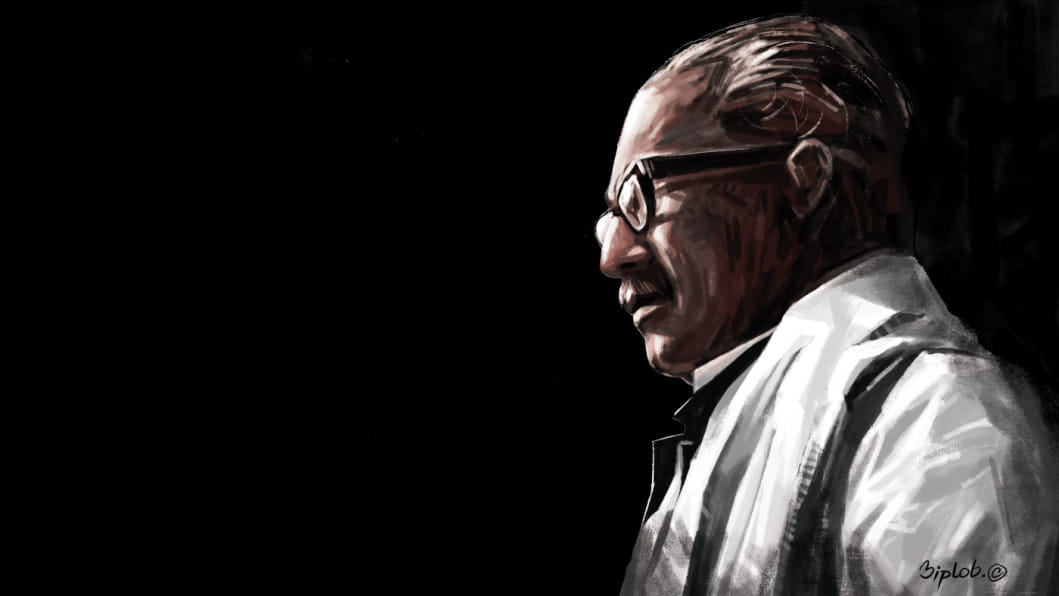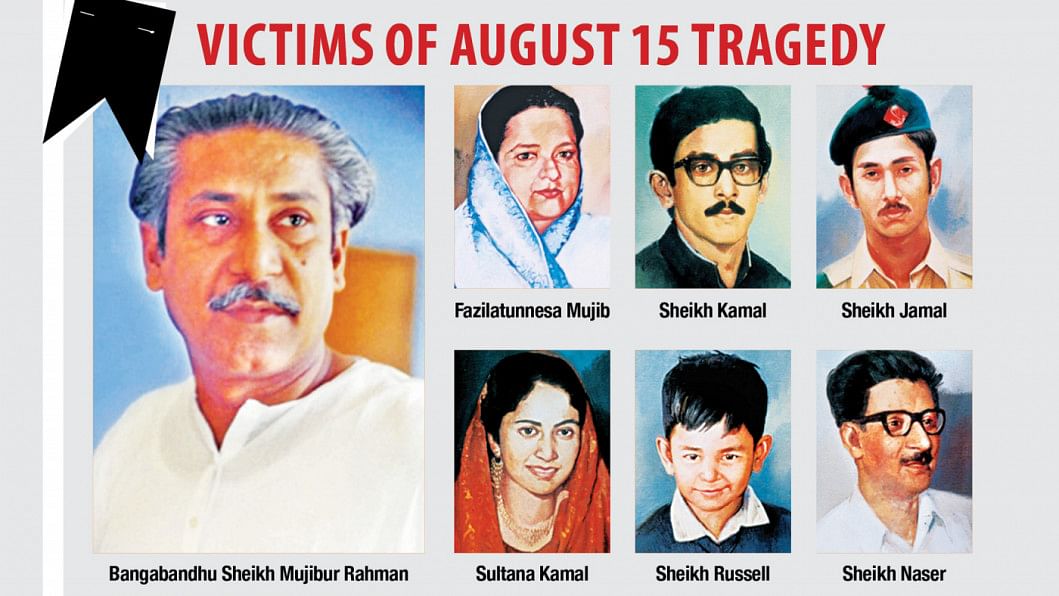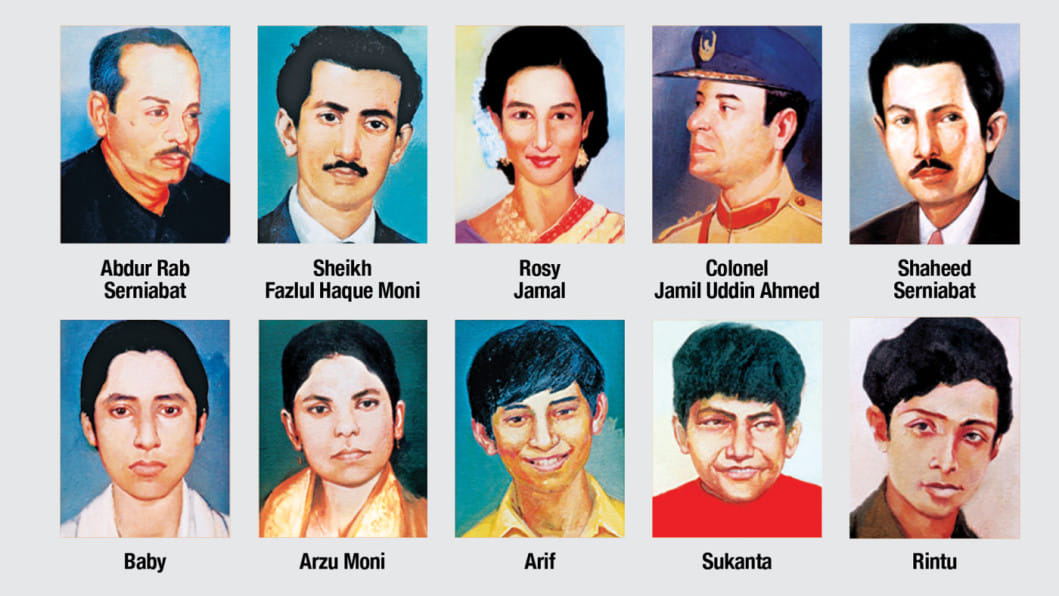A dawn darker than night

"I'm broken by the news of Sheikh Mujib's death. He was a great leader. His extraordinary heroism has been a source of inspiration for the people of Asia and Africa."
August 14, 1975.
The rumble of truck engines of the 2nd Field Regiment disturbed the evening quietness at Dhaka cantonment. Loaded with 105mm cannons, the heavy-duty trucks began heading from the southern end of the cantonment to the under-construction airport on the capital's edge.
"The killers were able to murder Bangabandhu Sheikh Mujib but they could not kill his dreams and ideals."
Hours later, around 10:00pm, several Bengal Lancer T-54 tanks left their units in the north of cantonment and rolled down towards the airport, only to join the 2nd Field Regiment. On the barren field of the airport, 18 cannons and 28 tanks assembled.
The soldiers present there were still unsure what was going to happen.
Then, around 11:30pm, some rogue army officers including Major Shariful Haque Dalim, Major Noor Chowdhury, Captain Mohammed Bazlul Huda, and Major Shahriar Rashid gathered there.
Around the same time, a group of soldiers led by Major Rashid collected arms and ammunition from the armoury of the 2nd Field Artillery. Preparations for carrying out a massacre in which Bangabandhu Sheikh Mujibur Rahman and most of his family members would be killed were almost done.
As the clock struck half past 12, Major Farooq Rahman, one of the masterminds of the carnage -- the most horrific one in the history of Bangladesh -- disclosed the operation plan before the officers.
Events went ahead according to their plan. Around 4:00am in the morning, the tanks rumbled down the empty roads of Dhaka to their destinations.
Thus began the fateful mission that was to change the country's destiny forever.
One team headed for President Mujib's residence in Dhanmondi while another moved towards Minto Road and the third group went to another part of Dhanmondi where Bangabandhu's nephew Sheikh Fazlul Haq Moni lived with his family.
Major Dalim took charge of attacking the house of Bangabandhu's brother-in-law Abdur Rab Serniabat on Minto Road. Risaldar Moslemuddin Khan was given the responsibility of attacking Sheikh Moni's house.
Major Shahriar was in charge of the radio station, the university, and New Market area. The group was also given the responsibility to repel any attack by the BDR at Pilkhana.
Major Farooq Rahman himself took the responsibility of resisting the security forces at Sher-e-Bangla Nagar with his tanks, although there was no ammunition in those.
It was around the time for changing the guard at Bangabandhu's residence at House 677 of Road 32.
Inside the house, everybody was still in deep sleep: President Mujib, his wife Sheikh Fazilatunnesa Mujib, their sons Sheikh Kamal, Sheikh Jamal and Sheikh Russell, daughters-in-law, and his brother Sheikh Naser.
Nurul Islam Khan, the then deputy superintendent of police, was supervising the guards that night. With him was Bangabandhu's personal assistant AFM Mohitul Islam who went to bed at around one in the morning.
Little did they imagine that they would be waking up to a morning darker than night.
Around 4:30am to 5:00am, Mohitul was awakened by telephone mechanic Abdul Matin, who informed him that President Mujib was on the telephone line.
"Serniabat's house came under attack by some armed men!" Bangabandhu spoke on the phone from his first floor bedroom. "Get the police control room immediately."
Mohitul dialled the police but failed to get through. Just then Mujib came down to the office room and asked whether he could contact the police control room. Mohitul replied in the negative.


Mohitul finally got the line of the Gono Bhaban exchange. Someone picked up the phone there but would not speak. The president took the handset himself and spoke into it: "This is President Sheikh Mujib speaking."
Right at that moment, a barrage of bullets shattered the windowpanes and hit the wall of the office room. The President himself lay down on the floor, pulling Mohitul to the ground to save him from bullets.
The building seemed to be trembling with rumbles of heavy gunshots from outside that continued for a while.
As the gunfire paused for a moment, Bangabandhu went on his way upstairs and managed to talk to Gen Shafiullah over phone and asked him to send forces immediately as his house was under attack.
Shafiullah replied: "I am doing something; can you get out of the house?"
House help Abdul rushed to the first floor and brought Bangabandhu's white panjabi and glasses. Putting those on, the president came out on the veranda.
"There are shootings all around. What are you doing?" he shouted at the sentries.
Nurul replied: "Sir, there has been an attack."
Bangabandhu went back to the upper floor.
In the meantime, Sheikh Kamal came down to the ground floor.
He asked Nurul whether the army had come. As he nodded, Kamal said, "Brothers from the army! Come inside!" Kamal said this twice loudly.
There was an eerie silence for a minute.
Just then five to six army men in khaki and black fatigues appeared holding submachine guns in their hands. One had a Sten gun. They barged into the residence and shouted: "Hands up!"
Bewildered at what was happening, Kamal said, "I am Sheikh Mujib's son."
Without any warning, Bazlul Huda shot Kamal in the leg. Kamal jumped to Mohitul's side.
"Don't shoot him," Mohitul pleaded, "He is Sheikh Kamal. Sheikh Mujib's son."
Upon hearing this, Bazlul Huda again fired at Kamal. He lay dead.
The killers went upstairs. Around 20-25 more people in army uniform joined them. Before going upstairs, they asked some soldiers to keep watch on Mohitul and others gathered near the gate and hurried to the first floor.
Mohitul could hear intermittent gunfire and the cries of the women upstairs. He also heard the loud voice of Bangabandhu.
Havildar Md Quddus Sikder, who had arrived at the residence around 4:45am on his regular duty, saw the terrible events unfold. He was part of the president's protection detail in the house and was also detained.
Huda and Nur ordered Quddus to follow them as they went up to the first floor along with their troops. As they walked up to the landing of the staircase, they saw Major Mohiuddin and his soldiers leading Bangabandhu down.
"Where is Kamal? What do you want?" Mujib demanded.
"You have to come with us, Sir," Huda stammered.
Nobody answered.
Suddenly, Huda and Nur aimed their Sten guns at Bangabandhu and pulled the triggers.
The president collapsed on the stairs. He was dead. His body lay there with blood flowing from the landing down the stairs. Blood streaked the walls as well.
The killers now ran riot in the house. The other members of the family holed up inside the bathroom attached to the main bedroom. But that did not help.
Just then the killers returned and entered the bedroom. After a few impatient knocks, they shot at the door.
Begum Mujib opened it.
She pleaded with the killers to spare her family members. The killers sprayed bullets at Begum Mujib, Sheikh Jamal, his wife Rosy, and Kamal's wife Sultana. The bodies fell in a heap.
Then they took Sheikh Naser and Sheikh Russell to the ground floor and made them stand in a line. Naser pleaded with them not to kill him, but the killers took him into the bathroom attached to Mohitul's office and shot him.
Naser begged for water, but a soldier shot him dead.
What happened next was the cruelest.
Trembling, Russell, Bangabandhu's 10-year-old son, wailed to be taken to his mother. Clutching Mohitul, he asked in a terrified voice: "Bhaiya, will they kill me too?"
"No bhaiya, they won't kill you," Mohitul had tried to console him.
One of the soldiers took Russell upstairs to the spot where his mother lay dead. Then came a burst of gunfire.
Shortly, Major Farooq met Huda at the gate and asked him something.
"All are finished," Huda replied.
As the Islamic call to prayer was heard in the mosques of the city, the assassins went about ransacking Bangabandhu's house and laying hands on everything of value they could find.
The group of soldiers which had earlier made its way to Minto Road, finished off Serniabat and his family.
In another part of Dhanmondi, soldiers rushed into the home of Sheikh Moni and shot him and his pregnant wife Arzoo, in front of their two young children.
Early on the morning of August 16, the soldiers collected the bodies and placed them in rough, makeshift coffins.
Except for Bangabandhu's body, all the other corpses were hastily buried in the cemetery in Banani.
Late in the afternoon, the body of Bangabandhu was laid to rest beside the graves of his parents in the village.
With the killings, things were not really finished. A new chapter unfolded in the history of the newly independent Bangladesh, taking the country backward.
The killers installed Khandaker Mushtaque, the commerce minister of Bangabandhu's government, as the president on the afternoon of August 15.
Mushtaque, who was a part of the heinous conspiracy, happily grabbed the presidency paying no heed to the constitution that barred him from assuming the office.
He was grateful to the killers. In his address to the nation, Mushtaque called the coup "changeover as historic necessities"and portrayed the killersas "the brightest son of the soil."
[The report is prepared based on the testimonies and depositions of AFM Mohitul Islam, Nurul Islam Khan and Quddus Sikder, and the book "Three army coups and some untold tales" by Lt Col MA Hamid.]

 For all latest news, follow The Daily Star's Google News channel.
For all latest news, follow The Daily Star's Google News channel. 




Comments